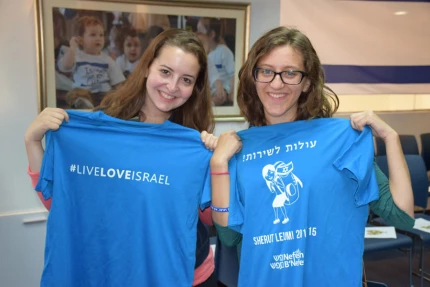Sherut Leumi
Sherut Leumi serves as a substitute for compulsory army service. Guys and girls enlist for this service in the Israeli security services and repatriate absorption organisations. It is also possible to serve in educational, medical and elderly care institutions.
What is Sherut Leumi?
Sherut Leumi is a programme in Israel that offers alternative service for young people in lieu of military service in the army. This service is designed for young people who, for various reasons, are unable or unwilling to perform military service, including religious beliefs, medical conditions or personal circumstances.
Sherut Leumi usually lasts 1-2 years and involves working in a variety of social, educational or cultural projects such as helping in community facilities, working with children, the elderly or in educational programmes. Programme participants get the opportunity to contribute to society and develop personal qualities and skills that may be useful in their future life.
History and development
After the establishment of the State of Israel in 1948, military service became compulsory for all citizens of Israel. However, within a few years, groups of people began to emerge who refused military service for various reasons. One such group were religious Jews who felt that military service was incompatible with their beliefs. Others, on the contrary, were opposed to military service for ideological or political reasons.
In 1974, an alternative, Sherut Leumi, was created in response to the needs of this group. This programme allowed young secular and religious Israelis to perform civilian service in various fields such as social services, education, health care and more. This was a significant step towards the recognition of rights and freedom of choice by Israeli society.
Sherut Leumi service lasts from 18 months to 2 years depending on the tasks and requirements. Programme participants are engaged in a variety of projects including:
National Service provides opportunities for young people to contribute to society, develop personal and professional skills, and gain unity and understanding among different sections of society. Sherut Leumi participants often have positive experiences that help them become more active citizens and have a deeper understanding of social issues in Israel.
Over time, Sherut Leumi’s popularity has increased, and in recent years more and more young people have chosen the programme as an alternative to military service. In modern times, Sherut Leumi continues to adapt to the changing conditions in Israel and public demands. The programme is expanding its functions, entering new areas such as working with technology and innovation, and is also actively involved in the integration of migrants and refugees.
an Israeli citizenship specialist
Main service areas
In addition, Sherut Leumi volunteers can participate in various cultural and environmental projects, working in museums, libraries, national parks and nature reserves. They can also be involved in programmes to integrate and adapt new immigrants into Israeli society.
Benefits of participation
One of the main benefits is the opportunity to contribute to society and help those in need. Programme participants have the opportunity to work in various fields such as education, health, social work and cultural projects, allowing them to gain valuable experience and develop skills that will benefit them in later life. Sherut Leumi also provides participants with financial support, including a monthly cash allowance, as well as benefits such as discounts on travel and housing costs. This is especially important for young people who are on the cusp of adulthood and can focus on their volunteer work without worrying about financial issues.
During their service, they have the opportunity to interact with people from different walks of life, which helps them broaden their horizons and develop interpersonal skills. Also, participation in Sherut Leumi can open doors for further education and professional development. Many employers and higher education institutions value the experience gained through this programme, which can have a positive impact on participants’ future career prospects.
Sherut Leumi offers a unique opportunity for young people to contribute to Israeli society, gain valuable experience, receive financial support and broaden their horizons. For many participants, this year of volunteer service becomes a turning point that determines their future life path.
Application process
Visit the official website for information on available programmes, requirements and procedures. It is necessary to create an account on the portal by providing personal data (full name, contact information, date of birth, etc.).
Once registered, you will be required to fill out a questionnaire. In the process of filling it out, you may be asked for:
- Personal information: full name, address, phone number, email, etc.
- Education: Indicate the school, colleges or universities you have attended.
- Past Experience: You may be required to provide information about your volunteer experience or involvement in other social projects.
Some programmes may require you to write a short letter of motivation in which you explain why you want to get involved with Sherut Leumi and what skills or qualities you can bring to the table. Once you have sent in your application, an interview is organised, which can be either face-to-face or online. This is the stage where you will be asked to talk about yourself, your interests and motivation, and what programmes you would like to be involved in. After the interview, you are left to wait for the panel’s decision. This can take from a few days to a few weeks depending on the programmes and season.
A recent update to the program has expanded the eligibility criteria for Sherut Leumi, now allowing anyone aged 17 to 24, regardless of nationality, to participate. Previously, this service was restricted to Israeli citizens, but non-citizens can now join the program with a B/4 Volunteer Visa.
With hundreds of options across Israel, selecting a Sherut Leumi placement can be tough. Start by narrowing down to five Tekanim, exploring translated listings and visiting the websites of organizations like Aminadav, Bat Ami, Agudah Lehitnadvut, and Shlomit. Speak with people who have experience in your field of interest.
an Israeli citizenship specialist
